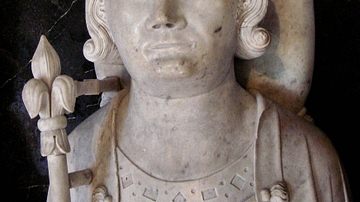Search
Search Results

Definition
Argead Dynasty
The Argead dynasty, the ancient Macedonian house of Dorian Greek origin, lasted from the 7th century to 310 BCE. The mythological founder of the dynasty was King Caranus but it was under Philip II of Macedon (382-226 BCE) that the Macedonian...

Definition
Edward III of England
Edward III of England reigned as king from 1327 to 1377. Succeeding his father Edward II of England (r. 1307-1327) following his enforced abdication and then murder, Edward III would take revenge on his father's enemies, who included the...

Definition
Cleopatra of Macedon
Cleopatra of Macedon (355/4-308 BCE), daughter of Philip II of Macedon (reign 359-336 BCE) and his Molossian queen, Olympias of Epirus (c. 375-316 BCE), was the only full sister of Alexander the Great (reign 336-323 BCE). Born in Pella, the...

Definition
Perdiccas
Perdiccas (d. 321 BCE) was one of Alexander the Great's commanders, and after his death, custodian of the treasury, regent over Philip III and Alexander IV, and commander of the royal army. When Alexander the Great crossed the Hellespont...

Image
Philip IV of France
Philip the Fair (r. 1285-1314 CE), Saint-Denis Basilica.

Article
Architects of France's 1901 Law of Associations
The Law of Associations was adopted by the French Parliament on 3 July 1901 to limit the influence of Catholic teaching orders as the first step toward the formal separation of church and state that would follow in 1905. Of 16,904 religious...

Definition
Demosthenes
Demosthenes (c. 384 - 322 BCE) was an Athenian statesman who famously stood against Macedonian king Philip II and whose surviving speeches have established him as one of the greatest patriots and powerful orators from ancient Greece. He is...

Definition
Eleanor of Aquitaine
Eleanor of Aquitaine (l. c. 1122-1204 CE) was one of the most impressive and powerful figures of the High Middle Ages (1000-1300 CE) – male or female – whose influence shaped the politics, art, medieval literature, and perception of women...

Definition
Cynane
Cynane (l. c. 357- 323 BCE, pronounced `Keenahnay') was the daughter of the Illyrian Princess Audata and King Philip II of Macedon, making her the half-sister of Alexander the Great (l.356-323 BCE). Following the Illyrian tradition of women...

Definition
Declaration of Pillnitz
The Declaration of Pillnitz was a joint statement issued on 27 August 1791 by Leopold II, Holy Roman Emperor (r. 1790-1792) and King Frederick William II of Prussia (r. 1786-1797). The declaration appealed to all European powers to unite...